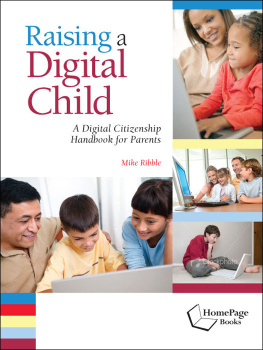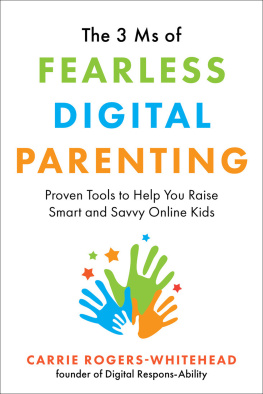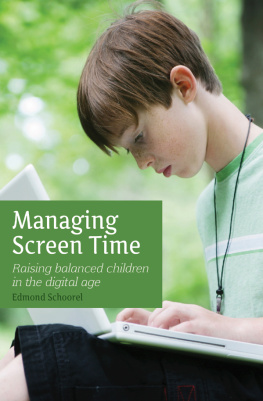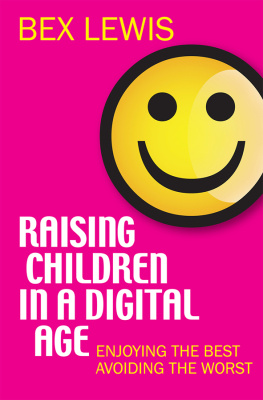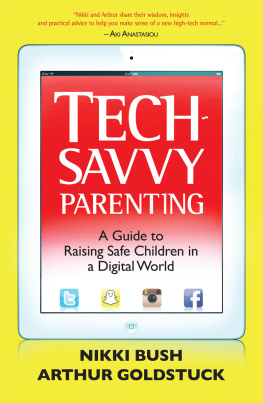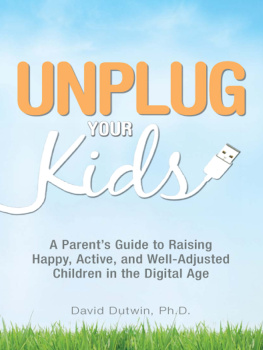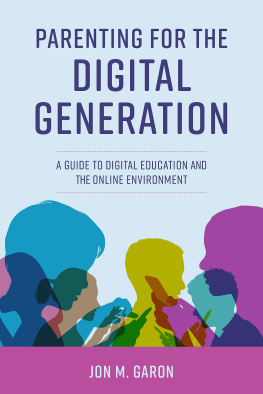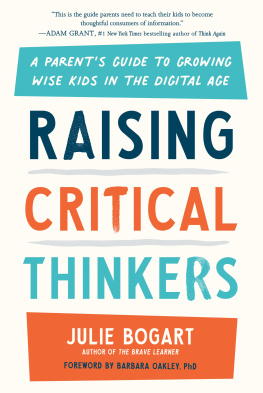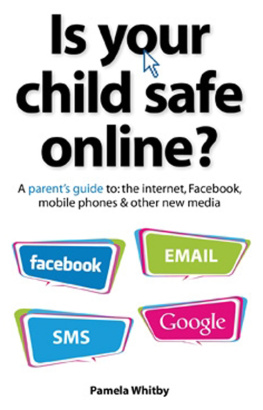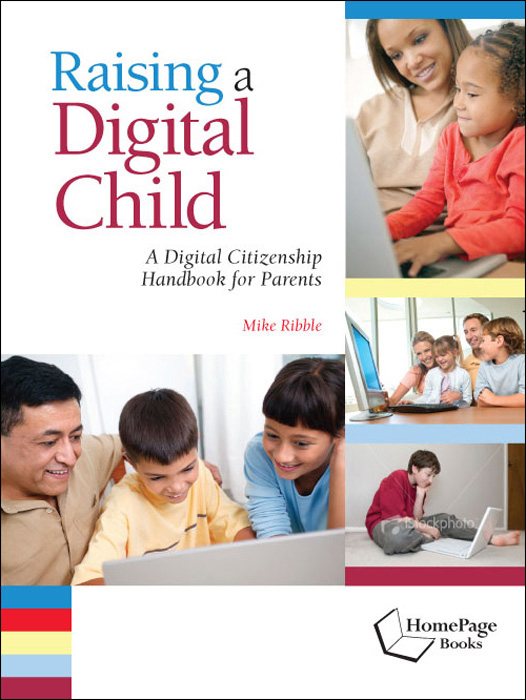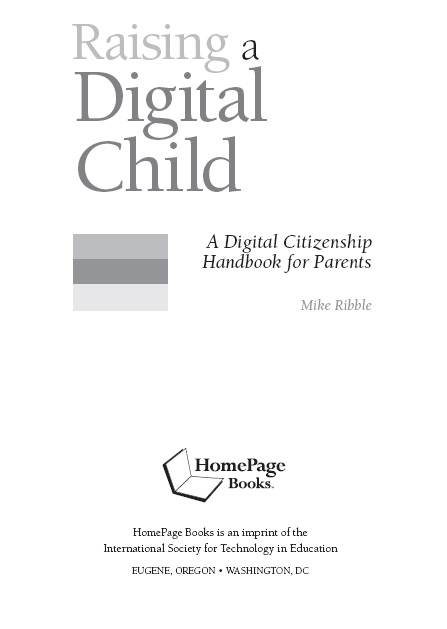
Raising a Digital Child
A Digital Citizenship Handbook for Parents
Mike Ribble
2009 International Society for Technology in Education
World rights reserved. No part of this book may be reproduced or transmitted in any form or by any meanselectronic, mechanical, photocopying, recording, or by any information storage or retrieval systemwithout prior written permission from the publisher. Contact Permissions Editor, ISTE, 180 West 8th Ave., Suite 300, Eugene, OR 97401-2916; fax: 1.541.302.3780; e-mail: .
Director of Book Publishing: Courtney Burkholder
Acquisitions Editor: Jeff V. Bolkan
Production Editors: Lynda Gansel, Lanier Brandau
Production Coordinator: Rachel Bannister
Graphic Designer and Book Design: Signe Landin | Rights and Permissions
Administrator: Lanier Brandau
Developmental and
Copy Editor: Lynne Ertle
Book Production: Tracy Cozzens |
Library of Congress Cataloging-in-Publication Data
Ribble, Mike.
Raising a digital child : a digital citizenship handbook for parents / Mike Ribble. 1st ed.
p. cm.
Includes bibliographical references.
ISBN 978-1-56484-250-3 (pbk.)
1. Computers and children. 2. Internet and children. 3. Digital media. 4. EducationParent participation. I. Title.
QA76.9.C659R53 2009
302.231dc22
2008051444
First Edition
ISBN: 978-1-56484-250-3
Printed in the United States of America
HomePage Books is an imprint of the International Society for Technology in Education. The HomePage Books name and logo are trademarks of the International Society for Technology in Education.
International Society for Technology in Education (ISTE)
Washington, DC, Office:
1710 Rhode Island Ave. NW, Suite 900, Washington, DC 20036-3132
Eugene, Oregon, Office:
180 West 8th Ave., Suite 300, Eugene, OR 97401-2916
Order Desk: 1.800.336.5191
Order Fax: 1.541.302.3778
Customer Service:
Book Publishing:
Rights and Permissions:
Web: www.iste.org
Cover photo (bottom right): iStockphoto.com/Bonnie Jacobs
About ISTE
The International Society for Technology in Education (ISTE) is the trusted source for professional development, knowledge generation, advocacy, and leadership for innovation. A nonprofit membership association, ISTE provides leadership and service to improve teaching, learning, and school leadership by advancing the effective use of technology in PK12 and teacher education.
Home of the National Educational Technology Standards (NETS), the Center for Applied Research in Educational Technology (CARET), and the National Educational Computing Conference (NECC), ISTE represents more than 100,000 professionals worldwide. We support our members with information, networking opportunities, and guidance as they face the challenge of transforming education. To find out more about these and other ISTE initiatives, visit our website at www.iste.org.
As part of our mission, ISTE Book Publishing works with experienced educators to develop and produce practical resources for classroom teachers, teacher educators, technology leaders, and parents. Every manuscript we select for publication is professionally edited. We look for content that emphasizes the effective use of technology where it can make a differenceboth at school and at home. We value your feedback on this book and other ISTE products. E-mail us at .
About the Author

Mike Ribble has worked at several different levels of education. He has served as a classroom biology teacher, a secondary school administrator, a network manager for a community college, and a university instructor. He received a doctorate in educational leadership at Kansas State University. His interests include technology leadership, professional development, and working with teachers to help enhance teaching and learning with technology. He has written several articles and has presented at regional and national conferences on digital citizenship and its effect on the changes within education.
Contents
Digital Citizen Creed
As a technological society it is our responsibility to provide the opportunity to work, interact, and use technology without the interference, obstruction, or destruction by the actions of inappropriate technology users. As digital citizens, we pledge to help create a society that strives to use technology appropriately. We will work with others to identify the needs of technology users and to meet those needs.
The following nine elements form the basis for appropriate technology use. These elements provide a starting place to help all technology users understand the fundamentals of digital citizenship. There is no way to predict what the future holds for us in terms of new technologies, but we can lay the foundation now for appropriate use. By becoming more aware of the issues related to technology, everyone can become better digital citizens.
Digital Access: full electronic participation in society
Can all technology users participate in a digital society at acceptable levels if they choose?
Digital Commerce: the buying and selling of goods online
Do technology users have the knowledge and protection to buy and sell in a digital world?
Digital Communication: the electronic exchange of information
Is there an understanding of the various digital communication methods and when each is appropriate?
Digital Literacy: the capability to use digital technology and knowing when and how to use it
Have technology users taken the time to learn about various digital technologies and when their use is appropriate?
Digital Etiquette: the standards of conduct expected by other digital technology users
Do technology users consider others when using digital technologies?
Digital Law: the legal rights and restrictions governing technology use
Are technology users aware of rules, policies, or laws that govern the use of digital technologies?
Digital Rights and Responsibilities: the privileges and freedoms extended to all digital technology users, and the behavioral expectations that come with them
Are technology users ready to protect the rights of others and to defend their own digital rights?
Digital Health and Wellness: the elements of physical and psychological well-being related to digital technology use
Do technology users consider the risks (both physical and psychological) when using digital technologies?
Digital Security: the precautions that all technology users must take to guarantee their personal safety and the security of their network
Do technology users work to protect their own information and that of others?
These nine elements and their core questions form the backbone of digital citizenship. If we are to be effective users of technology we must act in appropriate ways, as well as teach others the proper behavior. These should be the duties of all digital citizens.

